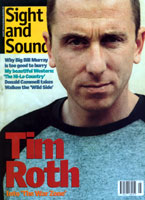Primary navigation

Germany/France 1997
Reviewed by Richard Falcon
Our synopses give away the plot in full, including surprise twists.
At a a remote Berchtesgaden villa in the mountains, Rebecca, a young translator, meets her ski-instructor boyfriend Marco. They impulsively go off to have sex, so he leaves the keys to his car in the ignition. Rene, a projectionist at Sleepers, the local cinema and bar, happens past the window, photographs the couple making love and takes the car for a ride. Rene crashes into local farmer Theo and his family, gravely injuring Theo's young daughter. He stumbles off without helping them, but takes photographs first. The villa's owner Laura, also a nurse, assists in the operation on Theo's daughter. Unable to find Marco's snow-covered car, the police disbelieve Theo's story about a second driver. Laura encounters Rene in Sleepers and a relationship develops. Marco and Rebecca have a row about Rebecca only wanting him for sex, even though he's having an affair in the city and begins a fling with ski-student Nina. Rene explains to Laura he's suffering from short-term memory loss after having been blown up by a grenade. He takes photographs to compensate.
Laura invites Rene to the villa, but he fails to recognise it, while Marco becomes increasingly jealous of Rebecca's attraction to the newcomer. Rene discovers the insurance claim for Marco's car and the photograph causes him to search in vain through his own photographs for clues. Theo finds the car and discovers Marco's driving licence inside. Believing Marco is the hit-and-run driver, Theo sets his dog on Marco who skies to his death down a crevasse. Laura, pregnant, settles down with Rene and Rebecca returns to the city.
Soon to be better known in the UK for his upcoming, critically acclaimed Run Lola Run, Tom Tykwer describes this follow up to his successful 1994 debut Deadly Maria/Die tödliche Maria as a 'Liebesthriller'. It opens in rapid thriller style, each character introduced with a typewritten caption as he or she journeys by train and road into the snowy mountains. Twyker's own rhythmic music enhances the widescreen images of the mountainscapes as we're further seduced by the film's bravura visuals including match cuts between a close-up gash in Rebecca's thumb and the vertiginous mountain crevasse into which Marco will later plunge, dizzying 360-degree pans around Rene's head, and a shower stream hitting a bather's head horizontally across the frame. For much of the film's early reels this style keeps us hooked while Tykwer defers explaining Rene's memory loss.
Like Wolfgang Becker's Life Is All You Get (for which Tykwer wrote the screenplay) Winterschläfer aspires also to being a portrait of Twyker's own generation of people in their early thirties. Both couples are in hiding - if not hibernation - rootless and without ambition or drive. Tykwer uses the time bought by his elliptical narrative not just to exercise his stylistic muscle but also (less successfully) to compare and contrast the two relationships on display, which play out in the villa's cocoon-like interior. Rebecca and Marco's is based on sex and it is her frantic seduction of him that makes his car an open temptation to Rene. Rebecca is colour-coded red - from the drop of blood on her finger, to almost every piece of clothing, down to her underwear. Her physicality is stressed throughout, underscored by moments when she masturbates or pulls down her red tights to urinate in the snow.
Other characters are similarly coded. Marco, her lover, is dressed shades of blue. This overelaborate design and stylistic excess suggests Tykwer doesn't trust his essentially self-centred characters to interest us and there's an undeniable callousness in the movie's treatment of Rebecca. Laura's and Rene's relationship is based on their strangeness to each other and on the film's central mystery. Their relationship ought to survive since short-term memory loss is probably an asset in keeping shallow characters such as these interested in one another.
Winterschläfer seems to be suggesting Rene's condition could be a metaphor for his lost generation. Tykwer was a Berlin repertory cinema programmer and made television documentaries on Lars von Trier, Peter Greenaway and Wim Wenders among others. In the Wenders' Alice in the Cities (1974), the idea of a German in his early 30s trying and failing to grasp and order experiences through Polaroids becomes a resonant image of the dislocation of the immediate postwar generation. But as with von Trier's work, this European film heritage is both appropriated and surrounded by self-regarding stylistic prowess. Rene's memory loss is due to an accident with a practice grenade, not the ontological crisis of a 70s Wenders' hero. Like the Berchtesgaden setting, this narrative expedient offers a distant echo of the past, which is perhaps appropriate for the generation Tykwer is describing, if not exactly intellectually captivating.
The film works better as spectacle, best viewed without much thought. What, for example, is the terrific Josef Bierbichler - veteran of the anarchic 'anti-Heimatfilme' of Herbert Achternbusch - doing here playing the kind of Bavarian rustic common to so many traditional Heimatfilm? What Winterschläfer finally turns on is awakening its directionless characters to the fates they are rushing towards in the opening sequence. Marco's final ecstatically filmed plunge into a crevasse echoes the intervention of Romantic Destiny in Weimar cinema, described by Siegfried Kracauer as, "no mere accident but a majestic event that stirred metaphysical shudders in sufferers and witnesses alike." But the particular "majestic event" which climaxes this stylish but superficial film is prefaced by a lap dissolve which has Marco skiing towards Rebecca's huge red mouth, an image more befitting of a Bond-film title sequence.